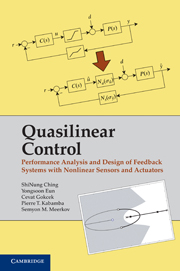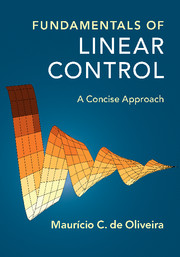Quasilinear Control
This is a textbook and reference for readers interested in quasilinear control (QLC). QLC is a set of methods for performance analysis and design of linear plant or nonlinear instrumentation (LPNI) systems. The approach of QLC is based on the method of stochastic linearization, which reduces the nonlinearities of actuators and sensors to quasilinear gains. Unlike the usual - Jacobian linearization - stochastic linearization is global. Using this approximation, QLC extends most of the linear control theory techniques to LPNI systems. A bisection algorithm for solving these equations is provided. In addition, QLC includes new problems, specific for the LPNI scenario. Examples include Instrumented LQR/LQG, in which the controller is designed simultaneously with the actuator and sensor, and partial and complete performance recovery, in which the degradation of linear performance is either contained by selecting the right instrumentation or completely eliminated by the controller boosting.
- Consists of original material which is not available in any other book on the market
- Extends most of the linear control methods to systems with nonlinear instrumentation, such as root locus, LQR/LQG, Hinf and so on
- Formulates and solves novel problems related to simultaneous controller and instrumentation design and to recovery of performance losses due to instrumentation nonlinearity
- Includes bisection algorithms for solving QLC equations and descriptions of several applications of the developed techniques
Reviews & endorsements
'… this is a well-written, specialised book for advanced students that might effectively be used as a supplement to a more standard graduate course that covers nonlinear controls.' Mathematical Reviews
Product details
February 2011Hardback
9781107000568
300 pages
260 × 185 × 22 mm
0.68kg
154 b/w illus. 6 tables 82 exercises
Available
Table of Contents
- 1. Introduction
- 2. Stochastic linearization of LPNI systems
- 3. Analysis of reference tracking in LPNI systems
- 4. Analysis of disturbance rejection in LPNI systems
- 5. Design of reference tracking controllers for LPNI systems
- 6. Design of disturbance rejection controllers for LPNI systems
- 7. Performance recovery in LPNI systems
- 8. Proofs.





